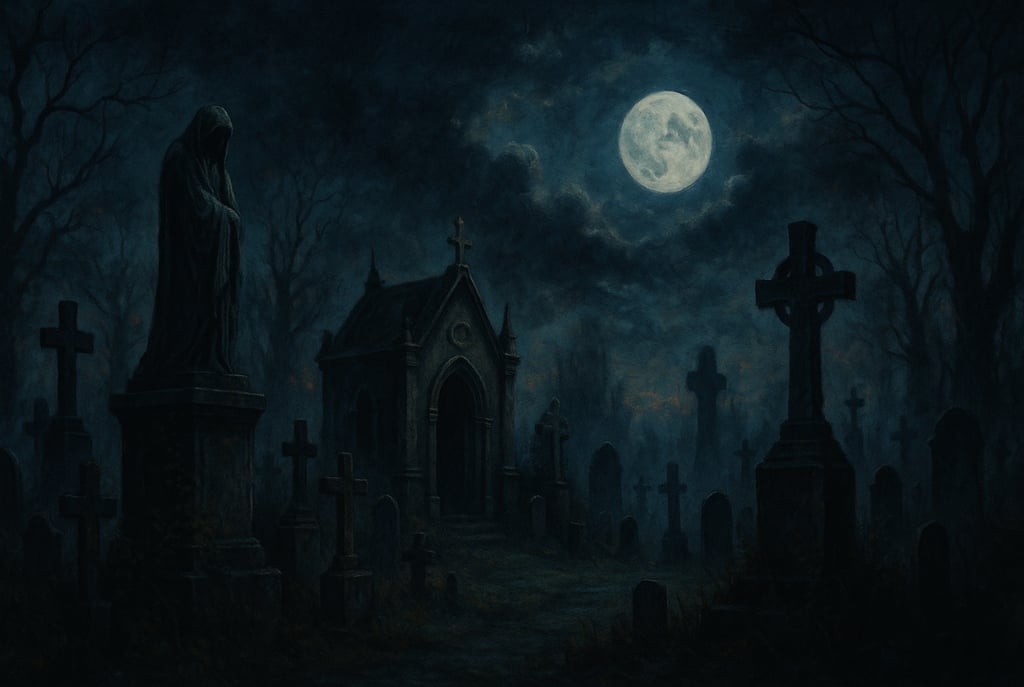Haunted Cemeteries of Cluj: Stories of Spirits and Restless Souls
Explore the Haunted Cemeteries of Cluj, where ghostly apparitions, glowing graves, and local legends reveal tales of restless spirits, forgotten souls, and whispers through the fog.
CLUJ & HAUNTED PLACES


In the quiet corners of Cluj-Napoca, where ivy climbs over wrought iron gates and forgotten gravestones lean beneath old trees, a different kind of history lingers — one whispered in shadows and flickering candlelight. The city’s cemeteries are not just resting places, but stages for ghostly apparitions, unsettling encounters, and stories passed down for generations.
The City of the Dead Beneath the City of the Living
Cluj is a city with layers — and not all of them are visible. Beneath its streets lie crypts, bones, and ossuaries, many of which are no longer marked. Over centuries, as the city expanded, graveyards were moved, and older burials buried again. Locals speak of streets that were once cemetery ground, and buildings where bones have turned up during renovation.
But it’s the known cemeteries — those still standing — that hold the most chilling tales.
Hajongard Cemetery: Cluj’s Grand Necropolis
Established in the 16th century, Hajongard (Cimitirul Central) is Cluj’s most famous cemetery. Monumental, beautiful, and still active, it’s also said to be haunted.
Locals tell of a woman in black seen walking among the older graves near twilight, vanishing when followed. Another persistent tale involves an eerie white mist that curls along the central pathways in early morning — even on clear days — accompanied by the distant toll of a bell no longer there.
Caretakers have reported cold spots, sudden winds, and the sound of soft weeping with no visible source. Some say it's the spirit of a heartbroken woman who took her life in the early 1900s, buried under a now-faded stone angel.
Forgotten Graveyards and Lost Resting Places
Before Hajongard became the city’s main burial ground, Cluj had several smaller cemeteries — many now vanished or built over. One such location is rumoured to lie beneath a quiet section of the old city, where shopkeepers have reported unexplained chills, flickering lights, and feelings of being watched after dark.
Others speak of a mass grave for plague victims, lost to time. In the 18th century, outbreaks swept through Cluj, and rapid burials were common. Some believe the spirits of these hurriedly buried souls still wander, seeking peace — or recognition.
The Jewish Cemetery: Symbols and Silence
Tucked behind high stone walls and overgrown greenery, Cluj’s Jewish Cemetery is a place of profound beauty and sorrow. Rows of worn Hebrew inscriptions mark the lives of those lost, many to violence, war, and displacement.
Here, stories circulate of visitors feeling an intense pressure in the chest near certain grave clusters, or catching fleeting glimpses of figures in tall black coats — particularly around Yom Kippur. Others have heard whispers in Yiddish, though no one living is nearby.
Some paranormal investigators suggest this cemetery is “thin” — a place where the veil between worlds wears thinner, especially during dusk and certain religious holidays.
Ghost Lights and Graves That Glow
One of the more persistent urban legends around Cluj’s cemeteries involves “morminte luminate” — glowing graves. Witnesses describe small orbs of light rising from the earth, hovering for seconds, and then fading. Science chalks it up to gas and decay, but folklore insists these are spirits rising at the witching hour, drawn to unfinished business.
Similar lights have been seen by night guards and late-night wanderers, often accompanied by dogs barking uncontrollably or sudden, unnatural silence.
Why Cemeteries?
Romanian folklore has long held that the soul lingers after death — for forty days, sometimes longer if unsettled. Cemeteries are liminal spaces, sacred but also vulnerable. If someone dies tragically, is buried improperly, or if grave rituals are ignored, it’s said the soul cannot rest.
From the moroi (restless dead) to strigoi (vampiric spirits), Romanian legends are full of warnings: tend the grave, light the candles, and never speak ill of the dead.
Whether you believe in spirits or simply appreciate the atmosphere, Cluj’s cemeteries are places where time seems to slow, and the air grows thick with memory. Walk quietly, speak gently, and if you feel a presence, it may not be your imagination.
After all, in a city so old and storied, who’s to say all its residents are truly at rest?
